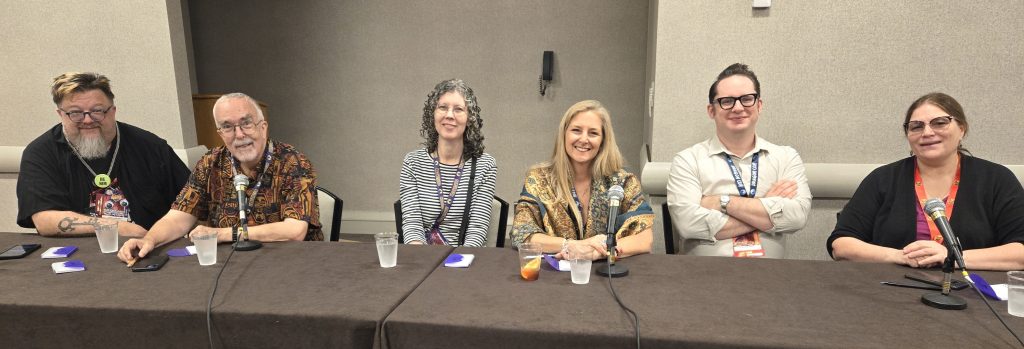One problem aspiring writers face is the overwhelming, and often contradictory, advice offered online. There’s no dearth of websites on writing and submitting, but how do you know which recommendations to follow? Should you remove every adjective and adverb? Use only said and no other dialogue tags? Create a social presence and gather a following before you try to sell your work to a publishing house? A distinguished panel of agents and editors—David Afsharirad, Lucienne Diver, John Hartness, Steve Saffel, Anne Sowards, and Toni Weisskopf—answered these questions and more during the panel “Agents and Editors Tell All,” moderated by Saffel, on Saturday at 2:30PM in Hyatt Embassy EF.

One of the first topics they discussed was the I-can-write-better-than-this mindset some aspiring writers have after reading something that’s not good. According to Afsharirad, that’s setting the bar too low. The secret, Weisskopf added, is to write as well as the best authors, like Weber and Bujold, not better than the worst. Diver encouraged writers to “always put your best foot forward.” She wants to see wonderful manuscripts and queries. Hartness agreed. Send in “your best you.”
To illustrate a winning combination of query and manuscript, Diver brought up Medusa’s Sisters by Lauren J. A. Bear. When Diver read it, she not only thought the concept was saleable but also loved the writing. “This lady,” she said, “can tell a story.” In the same vein, Sowards referenced Kaikeyi by Vaishnavi Patel. Sowards loves retellings and labeled Patel’s as brilliant. The panelists agreed that it doesn’t matter how good the pitch is if the manuscript isn’t equally good. Sowards also noted that new writers tend to be afraid the editors will chop up their manuscripts. Not true. They wouldn’t make an offer if they didn’t love it. If she gives you editing to do, you don’t have to fix it the exact way she suggests. “Just fix it,” she said.
The panelists listed some mistakes to avoid. Weisskopf recommended “don’t be a jerk,” both online and in person. She checks. Editors and agents want to enjoy working with you. Only start a blog if you plan to update it often and that doesn’t mean once a decade. A newsletter and list of followers can be helpful, but posting online can do you more harm than good (see jerk reference above). If you’re not interested in social media and marketing your own work, Weisskopf suggested that’s a good reason to go with a traditional publishing house. They do the marketing for you. Also, don’t pay for editing unless the editor has worked with one of the big publishing houses. Remember the well-known writing adage, money should flow to the writer.
Some suggestions on what to do included going to literary conventions where you can pitch your work. Also attend mentor sessions and ask questions. Always be authentic and try to raise your work above the rest. It’s wise to use said most of the time, but it’s fine to toss in some other dialogue tags occasionally. As for adjectives and adverbs, their use is not taboo, but don’t overuse them. One adjective per noun is too much, and it’s always better to show a character’s emotion than to rely on an adverb.
In the end, there’s no special code that must be followed, no winning style or story structure. Try to develop a distinctive voice that sets your work apart. What matters most is to make agents and editors fall in love with your manuscript.
